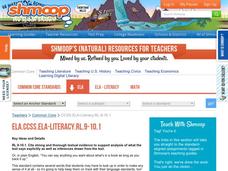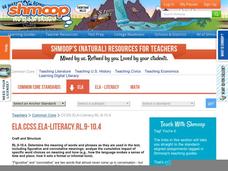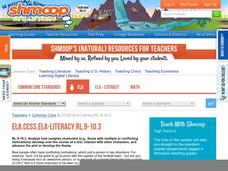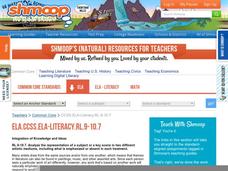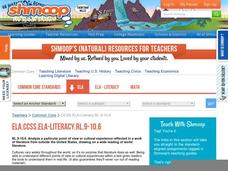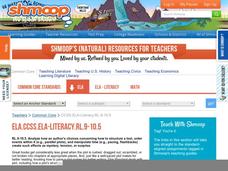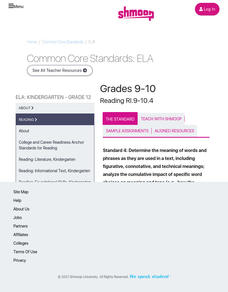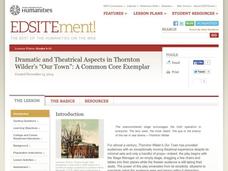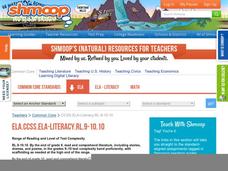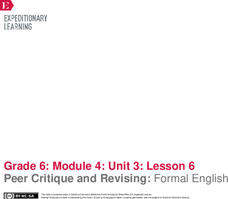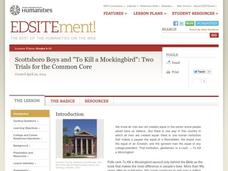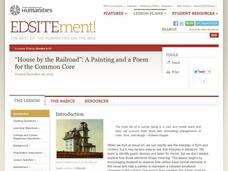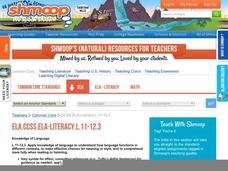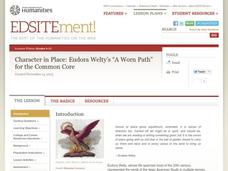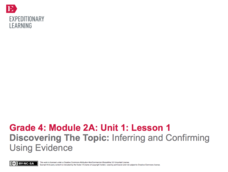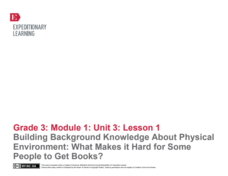The New York Times
Fiction or Nonfiction? Considering the Common Core's Emphasis on Informational Text
Nothing aids in comprehension more than an explanation and understanding of why things are done. Address why the Common Core requires the reading percentages that it established and analyze how this affects your readers. Learners read...
Shmoop
ELA.CCSS.ELA-Literacy.RL.9-10.1
Does your ELA class need some practice with the specific skills outlined in the Common Core standards? Then this is the perfect resource for you! One in a series of connected lessons that cover the standards for reading literature,...
Shmoop
ELA.CCSS.ELA-Literacy.RL.9-10.4
The fourth standard for reading literature in the Common Core calls for young readers to be able to determine the figurative and connotative meanings of words and phrases. Use this resource, a continuation of a series of Common Core...
Shmoop
ELA.CCSS.ELA-Literacy.RL.9-10.3
Focus on complex characters with a lesson from a series that teaches individual skills from the Common Core. Specifically, this resource provides practice with standard RL.9-10.3. Get pupils thinking and talking about characters with the...
Shmoop
ELA.CCSS.ELA-Literacy.RL.9-10.9
As the saying goes: there are no new stories. Standard 9 for reading literature in the Common Core addresses this fact and requires that students be able to analyze how authors use the themes, stories, and characters of earlier works....
Shmoop
ELA.CCSS.ELA-Literacy.RL.9-10.7
Use this resource's pairings of classical literature and paintings to practice the skill of comparing different artistic mediums with your ELA class. Addressing standard 7 for literature in the Common Core, the resource encourages your...
Shmoop
ELA.CCSS.ELA-Literacy.RL.9-10.6
Being able to identify and understand the point of view of fictional characters across a wide range of time periods, places, and cultures is a skill that is necessary for becoming a proficient reader. It is also a skill identified in the...
Shmoop
ELA.CCSS.ELA-Literacy.RL.9-10.5
Your students already know when they like a story and when they don't, but they may not know that the plots of these stories are shaping that opinion. Like all resources in this series, the two activities and quizzes provided here deal...
Shmoop
ELA.CCSS.ELA-Literacy.RI.9-10.4
Your pupils will be expected to determine the meaning of words and how those words affect the meaning of a text. Help them master this skill with the ideas listed here. First, look over the two activities that could be used for your...
National Endowment for the Humanities
Dramatic and Theatrical Aspects in Thornton Wilder’s “Our Town”: A Common Core Exemplar
“So I’m going to have a copy of this play put in the cornerstone and the people a thousand years from now’ll know a few simple facts about us.” Our Town is used as the text in a Common Core exemplar that examines the dramatic and...
Shmoop
ELA.CCSS.ELA-Literacy.RL.9-10.10
How do you assess what your pupils have learned over the course of the year? Find out how competent they are at reading and analyzing age-level literature with the ideas presented here. Included in this resource are two suggested...
EngageNY
Peer Critique and Revising: Formal English
Dear Sir or Madam: What's the difference between formal and informal language? Scholars focus on using formal English and transitions in their position papers. After revising their rough drafts, they engage in the peer editing process...
National Endowment for the Humanities
Scottsboro Boys and "To Kill a Mockingbird": Two Trials for the Common Core
Here's a must-have resource for anyone reading To Kill A Mockingbird or using Harper Lee's award-winning novel in a classroom. The packet contains Miss Hollace Ransdall's first-hand, factual account of the trials of the Scottsboro Boys,...
National Endowment for the Humanities
“House by the Railroad”: A Painting and a Poem for the Common Core
Introduce your class to ekphrastic poetry with an exercise that asks them to examine Edward Hooper's painting House by the Railroad and Edward Hirsch's poem "Edward Hopper and the House By the Railroad." After a close reading of the two...
Shmoop
ELA.CCSS.ELA-Literacy.L.11-12.3
Tired of simple sentences? Bored by brief sentences? Plagued by boring sentences? Enrich your life and the writing of your pupils by modeling how to combine sentences to create more varied syntax. Groups then find a number of ways to...
Shmoop
ELA.CCSS.ELA-Literacy.RI.11-12.5: Structure of an Argument
Imagine a cross-curricular project that not only rewards learners for examining the textbooks used in their other classes but builds literacy skills as well! Groups compare the formats and writing style in their various textbooks. Teams...
National Endowment for the Humanities
Character in Place: Eudora Welty’s “A Worn Path” for the Common Core
How do writers use the interaction between elements like characterization and setting to create meaning? Readers of "A Worn Path" create a series of comic book-style graphics of Eudora Welty's short story and reflect on how Welty uses...
Curated OER
Advertising in the Contemporary World: An Introduction to Persuasive Texts
Beginning a persuasive writing unit with your middle schoolers? Approach it through something that persuades us all: advertising! Through studying video and print advertisement, your class will practice Common Core skills for reading...
Southern Nevada Regional Professional Development Program
Focus: Spelling Common Words
If you’re going to get a tattoo, make sure your artist writes it right because it’s hard to correct their inkings. That’s the big idea in this short lesson on commonly misspelled words like their/there/they’re and it’s/its. Images and a...
EngageNY
Getting to Know Esperanza (Chapter 2: “Las Uvas/Grapes”)
Delve into Esperanza Rising by Pam Muñoz Ryan with close reading and evidence-based, text-dependent questions. Part of a unit series, this well-sequenced, Common Core designed instructional activity draws on material from the previous...
EngageNY
Building Background Knowledge: Why Do Workers Strike? (Chapter 11: "Los Aguacates/Avocados")
Make connections between Esperanza Rising and human rights with the activities outlined here. The instructional activity starts out with a brief quiz and review of the novel. After that, pupils circulate and share quote strips that you...
EngageNY
Understanding Themes in Esperanza Rising
Determining a theme or central idea is greatly emphasized in the Common Core standards. Target that skill though big metaphors and central symbols in Pam Muñoz Ryan's Esperanza Rising. Help your class reach the standard through...
EngageNY
Discovering the Topic: Inferring and Confirming Using Evidence
Allow your class to figure out what they will be studying through an inquiry-based anticipatory set that involves analysis of mystery documents and practice with making inferences. The lesson plan document includes a detailed description...
EngageNY
Building Background Knowledge About Physical Environment: What Makes it Hard for Some People to Get Books?
How far would your pupils go to be able to have access to books? Revisit Heather Henson and David Small's That Book Woman and challenge class members to take on the role of Cal or the Book Woman. By putting themselves in someone else's...



